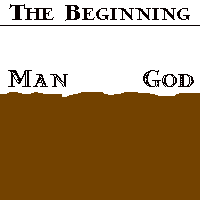The ledger God keeps in heaven is vastly contrary to ours.
God does not put our bad deeds on the left and our good deeds on the right,
and when our life is over the sum total of the sides determines our fate.
This is not how God weighs things. "Our Lord's words are not, 'Do this,
or don't do that,' but—'Come to me.'" (Oswald Chambers)
One might say that the left side of the ledger is religion and rules—right
and wrong, bad and good". All of these are considered "debt". The right
side of the ledger represents the free gift of salvation through faith
in and relationship with Jesus Christ. Faith and faith alone is posted
on the "credit" side of the ledger. The left side of the ledger represents
our efforts to earn our way to heaven or our complete disregard and disdain
for heaven.
We couldn't carry
this off
by our own efforts,
and we know it.
Paul, the writer of most of the epistles in the New Testament, says
it best. "We couldn't carry this off by our own efforts, and we know it—even
though we can list what many might think are impressive credentials. You
know my pedigree: a legitimate birth, circumcised on the eighth day; an
Israelite from the tribe of Benjamin; a strict and devout adherent to God's
law; a fiery defender of the purity of my religion, even to the point of
persecuting Christians, a meticulous observer of everything set down in
God's law Book. The very credentials these people are waving around as
something special, I'm tearing up and throwing out with the trash—along
with everything else I used to take credit for. And why? Because of Christ.
Yes, all the things I once thought were so important are gone from my life.
Compared to the high privilege of knowing Christ Jesus as my Master, first
hand, everything I once thought I had going for me is insignificant—dog
dung. I've dumped it all in the trash so that I could embrace Christ and
be embraced by Him. I didn't want some petty, inferior brand of righteousness
that comes from keeping a list of rules when I could get the robust kind
that comes from trusting Christ—God's righteousness. I gave up all that
inferior stuff so that I could know Christ personally, experience his resurrection
power, be a partner in his suffering, and go all the way with him to death
itself. If there was any way to get in on the resurrection from the dead,
I wanted to do it" (Philippians 3:4-11 The Message).
On this subject Charles Spurgeon has written, "Is it not a strange
thing that some professors should look to Christ alone for pardon and justification,
and run away to Moses when they desire sanctification? The child of the
bond woman is driven by the whip, but the child of the free woman is drawn
by cords of love. This is a motive fit for the child of the free woman,
and it moves His heart. The love of Christ constrains us. Not fear of hell,
but love of Christ. Not fear that God will cast us away, for that he cannot
do, but the joy that we are saved in the Lord with an everlasting salvation
constrains us to cling to him with all our heart and soul, forever and
ever. Rest assured, if motives fetched from the gospel will not kill sin,
motives fetched from the law never will. If you cannot be purged at Calvary,
you certainly cannot be cleansed at Sinai. If 'the water and the blood,
from the riven side which flowed,' are not sufficient to purify you; no
blood of bulls or of goats; I mean, no argument from the Jewish law, will
ever furnish motives sufficiently strong enough to cast out sin. Let your
reasons for being holy be found in Christ, for he is made of God unto you
sanctification!
Is it not a strange
thing
that some professors
should look to Christ
alone
for pardon and justification,
and run away to
Moses
when they desire
sanctification?
Charles Spurgeon
"I have ever found that the more entirely I lean upon my Lord, the
more conscious I am of my own emptiness and unworthiness. And the more
completely I rest my whole salvation upon the grace of God in Christ Jesus,
the more carefully do I walk in my daily life. He that has this hope in
Him purifies himself, even as he is pure. Jesus, the Savior, saves us from
our sins, and is made of God to us 'sanctification.'"
The Lord is less interested in knowing whether we're good or bad,
what we have done or haven't done, than He is in knowing whether we are
entrusting our very lives to Him. It is the source of our debts that is
the culprit, and that source is our claim to our right to ourselves. Once
we forsake and surrender this claim to ourselves in faith to the rule and
reign of Jesus Christ, His life and light penetrate the darkness of our
souls, and our lives are brought into harmony with His heavenly desires
for us. The dread of forsaking our "precious" and "clever" selves is forever
gone, and we frequently wonder, "What took me so long to let go of my vile
and selfish self?"
Just as I am
without one plea
But that Thy blood
was shed for me.
Charlotte Elliott
This devotional by Charles Spurgeon seems to be the perfect ending
for this article.
"'Behold, I am vile' (Job 40:4).
"One cheering word, poor lost sinner, for thee! You think you must not
come to God because YOU are vile. Now, there is not
a saint living on earth but has been made to feel that he is vile. If Job,
and Isaiah, and Paul were all obliged to say 'I am vile,' oh, poor sinner,
wilt thou be ashamed to join in the same confession? If divine grace does
not eradicate all sin from the believer, how dost thou hope to do it thyself?
and if God loves His people while they are yet vile, dost thou think thy
vileness will prevent His loving thee? Believe on Jesus, thou outcast of
the world's society! Jesus calls thee, and such as thou art.
'Not the righteous, not the righteous;
Sinners, Jesus came to call.'
"Even now say, 'Thou hast died for sinners; I am a sinner, Lord Jesus,
sprinkle Thy blood on me'; if thou wilt confess thy sin thou shalt find
pardon. If, now, with all thy heart, thou wilt say, 'I am vile, wash me,'
thou shalt be washed now. If the Holy Spirit shall enable thee from thy
heart to cry.
"'Just as I am, without one plea But that Thy blood was shed for
me, And that thou bidd'st me come to Thee, O Lamb of God, I come!' thou
shalt rise from reading this morning's portion with all thy sins pardoned;
and though thou didst wake this morning with every sin that man hath ever
committed on thy head, thou shalt rest tonight accepted in the Beloved;
though once degraded with the rags of sin, thou shalt be adorned with a
robe of righteousness, and appear white as the angels are. For "now," mark
it, 'Now is the accepted time'. If thou 'believest on Him who justifieth
the ungodly thou art saved.' Oh! may the Holy Spirit give thee saving faith
in Him who receives the vilest." From Morning and Evening by Charles
Spurgeon.
We can bring our debts to the cross and leave them there by surrendering
ourselves to the Lord Jesus Christ—by giving Him the reins to our lives
and allowing Him to reign there.
Lord Jesus. I come to you burdened with the debts of self. I lay
them at your feet and ask you to forgive them and to forgive me. I surrender
all I know to surrender to You. Deliver me from the bondage of rules and
being consumed with myself. Draw me into a deep and abiding relationship
with you. Meet me at the greatest point of my need. Be glorified in and
through my life. I ask in Your Name, Jesus. Amen
If there be one stitch
in the celestial garment
of our righteousness
which we are
to insert ourselves,
then we are lost,
but this is our confidence,
the Lord who began will
perfect.
He has done it all,
must do it all,
and will do it all.
Charles Spurgeon







